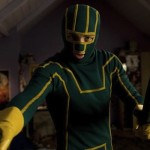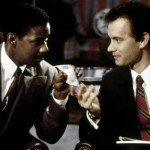Dawn of the Planet of the Apes Review
Dawn of the Planet of the Apes is one of the most unusual big-budget Hollywood action movies I’ve ever seen. For one, it opens with a virtually silent 20-minute sequence—one that catches us up with characters from the film’s predecessor, Rise of the Planet of the Apes. There’s also next to no action until the 90-minute mark. Up to that point, it’s all character-building drama with a bend toward suspense.
It’s also rather small in scope. As superhero movies continue to dominate the box office charts, you rarely find a summer movie that isn’t about men trying to save the world. Dawn of the Planet of the Apes posits that humanity just might be relegated to a small quarantined area in San Francisco. Its leaders are simply trying to keep the community safe—not unlike their ape counterparts hidden deep in the woods outside the city. The small scale doesn’t mean Dawn isn’t without tension, however. On the contrary, director Matt Reeves does a rather incredible job connecting the dots between peaceful coexistence and inevitable conflict between these communities, and he does so by relying on themes that resonate and characters that live and breathe.
Caesar (Andy Serkis, incredible) is still in charge of his tribe of apes nearly a decade after he secured their freedom in Rise. In the intervening years, he married, had a son, and taught some of his fellow apes—including the very combat-minded Koba (Toby Kebbell)—to speak. As the film opens, Caesar’s second son is born, and when he’s asked by another ape if he thinks there are any humans left out there, he asserts that they aren’t so bad. But the weariness on his face is undeniable: for the sake of his family and friends, he sure as hell hopes there aren’t any humans out there.
And right on cue, one shows up and shoots (doesn’t kill) a young ape. His name is Carver (Kirk Acevedo), and he isn’t alone. On a trek to find and repair a dam that could restore power to their community, he’s accompanied by Malcolm (Jason Clarke), his wife Ellie (Keri Russell), and his son Alexander (Kodi Smit-McPhee), among a few others. Caesar is benevolent and tells them to leave and never come back, but Koba thinks he’s being short-sighted. Yes, letting them go prevents a war between the tribes right now, but when the humans get what they want, they’ll be a lot stronger and more dangerous.
Ultimately, the film is about xenophobia and how irrational fear or hatred of “the other” can lead to dire consequences. The San Francisco of this world is full of good men, good apes, bad men, bad apes, and a lot of fearful followers on both sides who are easily corrupted. Watching the shaky trust that develops as the good ones in each camp feel the other side out is both inspiring and a little disheartening. You want them to work things out, but a variety of factors—the worry and weariness they wear on their sleeves, the persuasive power of the rotten apples in their respective groups, and the film’s status as a prequel—all speak toward a less-than-happy ending.
The film is also damn well-made. Reeves isn’t a director who’s showcased a consistent visual style yet, but if he ends up settling more on the side Dawn of the Planet of the Apes than Cloverfield or Let Me In, he’ll have a long, very fruitful career. Of course, the special effects are spectacular. They were in Rise, and they’re arguably more impressive three years later. But the gorgeous tracking shots, the smartly staged action, the mise en scene—it’s all quite brilliant.
The human characters aren’t what the film will be remembered for, but they almost certainly mark the biggest area of improvement when you compare this film to Rise. Jason Clarke and Keri Russell are solid (the latter could have a little more to do). Gary Oldman gives a classic great-actor-in-a-blockbuster-movie performance. The strength instead lies in the way the characters are written. Their motivations are always evolving, and their actions usually make some sense—a rare thing in a movie like this.
The series doesn’t seem particularly concerned about catching up to the original Apes film anytime soon, and for good reason. What seemed like a throwaway cash grab for Fox back in 2011 has blossomed into one of the most thoughtful effects-driven franchises of all time. This film will be hard to top, but I can’t wait to find out what these filmmakers have in store for us next.

















One Response to Dawn of the Planet of the Apes Review